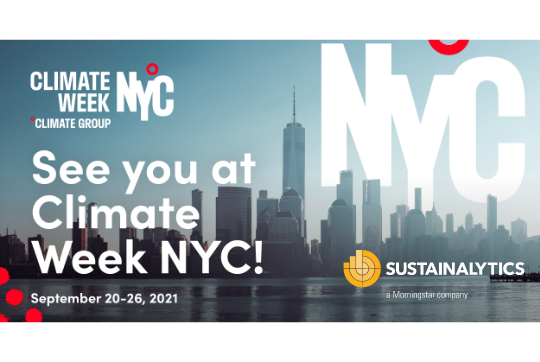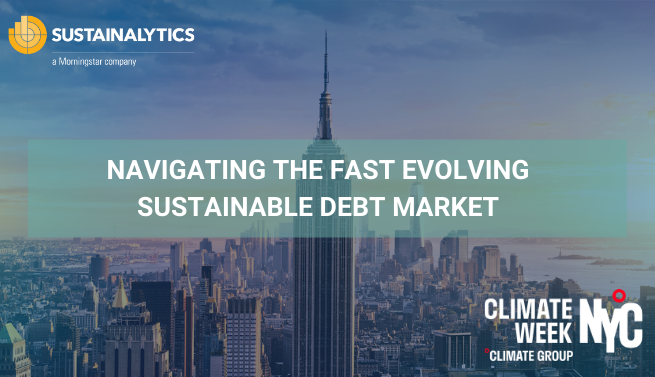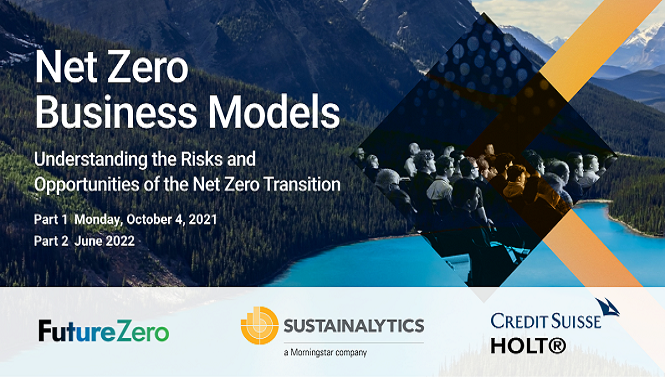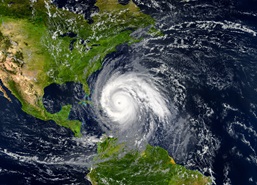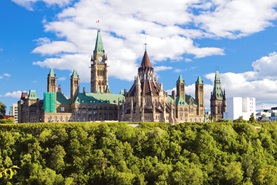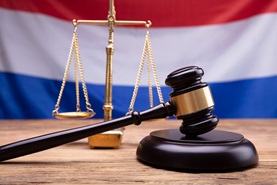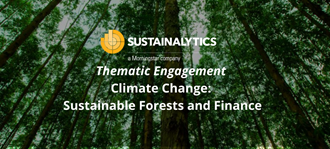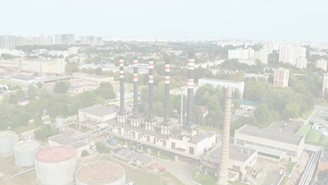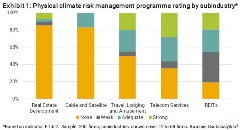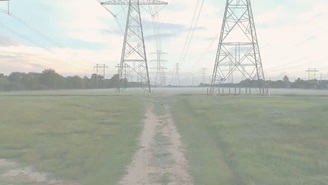#ClimateWeekNYC
There is broad recognition in the investment community that climate change poses significant investment risks and opportunities. As regulatory and industry pressures mount, investors are increasingly asking how they can manage climate impacts and risks in their portfolios.
This year’s Climate Week NYC has gone virtual, welcoming attendees from around the globe. This is the time and place to take in world-leading climate action. Sustainalytics is excited host a Climate Week event on sustainable debt. In addition, you can register for our highly anticipated Net Zero Business Models event coming up in October.
Our team members are keen to share climate change insights related to Sustainalytics’ industry-leading research, data, and solutions. Check out their content below. To learn more on how our climate solutions can help investors with security selection, stewardship activities, product creation, and for reporting, please contact us.
Climate Action Events
Navigating the Fast Evolving Sustainable Debt Market
Please join Sustainalytics during Climate Week NYC for a virtual event on Navigating the Fast-Evolving Sustainable Debt Market.
This session will cover:
A high-level overview of the state of the green, social and sustainable bond market
How investors are approaching this new market and whether these bonds complement or distract from a portfolio of traditional fixed income instruments
How corporations and sovereigns can determine which type of bond(s) and frameworks can meet investor expectations
Net Zero Business Models
Understanding the Risks and Opportunities of the Net Zero Transition
Part 1: Monday, October 4, 2021
Part 2: June 2022
Join climate experts and business leaders for a multi-faceted discussion about the risks and opportunities associated with the transition to Net Zero. Our virtual, must-attend conference will bring together global thought leaders to share their insights on:
The Innovation Required for a Net Zero Economy
Tracking Progress to Net Zero Business Models
Corporate Lifecycle, Strategic Leadership & Company Valuation Risks for the Net Zero Business Model Transformation
This event will provide you with practical insights, processes, tools & leading-edge analytics related to Net Zero and how to design a Net Zero business model, accelerate implementation, track, measure, and communicate progress and manage transition risk.
Climate Impacts
Impact of Climate Change and Extreme Weather on Essential Services
Utilities have found themselves in the literal and metaphorical eye of the storm over the last year as hurricanes, floods and wildfires of increasing frequency and strength have wreaked damage on their assets. In late August, Storm Ida made landfall in Louisiana, USA and devastated the power grid lines. Entergy, the utility operating in Louisiana, supplying most of New Orleans, restored 90% of the supply only by mid-September, with 87,000 customers still without power.
Delays, Questions and Confusion: Updates on the EU’s Sustainable Finance Disclosure Regulation
In this blog, we look at the delay of the level 2 regulation, some aspects of the Q&A, and the ongoing confusion and divergence around SFDR. We pay special attention to the potential impact of the Principle Adverse Impact indicators, an element of SFDR.
The Mutual Influence of Investors and Government
On issues from voting rights to climate change, the relationship between investors, companies, and governments has never been more dynamic. This has spurred a lively discussion about the impact and appropriate role of these actors in addressing systemic environmental and social issues. An increasingly cited view is that commitments made by businesses and investors are often superficial, and at best, can provide only incremental progress towards addressing the problems we face. Some go further to suggest that sustainable investing has done more harm than good, with the notion that these efforts have provided a false sense of progress and have delayed meaningful government action. This is a worthwhile debate, but my experience over the last eight years in the sustainable investing space has given me a very different perspective.
What Climate Litigation Means for the Oil & Gas Industry
As the global economy looks towards recovery after being impacted by the pandemic, the oil and gas industry faces a growing wave of shareholder activism and climate litigation due to a heightened focus on an accelerated transition as an indirect impact of the pandemic – painting an increasingly bleak picture for those within the industry.
Unwritten Risks – The True Costs of Mispriced Climate Change
Research shows that Property & Casualty insurance underwriters are not accurately pricing climate risks, and US government policy and program decisions are proving to be unsustainable. In our most recent blog, Justin Cheng talks about the resulting premium pricing corrections in the wake of intensifying extreme weather events. With this trend, a significant number of US homeowners are unable to obtain property insurance while taxpayers take on the increased cost of climate risk.
Climate Action through Stewardship
Recent market trends put engagement and voting front and centre for responsible investors
From a market perspective, engagement and voting on governance issues have been used as levers for influence for a long time. On the other hand, environmental and social issues were historically addressed from a values-based perspective or primarily for fact-finding purposes. Today, many responsible investors leverage corporate dialogue as a tool to influence and drive meaningful change and impact
North American Material Risk Engagement Trends: ESG Reporting Frameworks, Emission Reduction Targets and Beyond
There are many factors that rating agencies consider within its overall assessment. For example, ESG rating companies tend to look for at least three years of ESG metrics to determine company trends and long-term ESG targets, goals, and strategies to manage and reduce ESG risks at least five years ahead. Read on to learn about how Sustainalytics' Material Risk Engagement program promotes and protects long-term value by engaging with high-risk companies on financially-material ESG issues. (A North American Snapshot)
Royal Dutch Shell Court Order Shifts Paradigm for Corporate ESG Accountability
On 26 May 2021, the Court of The Hague orders Royal Dutch Shell (RDS) to reduce CO2 emissions to a net 45% by the end of 2030 compared to 2019 through the Group Policy of the Shell Group. The order of a national (Dutch) court demands that a global company (RDS) fulfills its obligations under the Paris Climate Agreement, although RDS was not a party in that agreement, and there is no legal equivalent in The Netherlands. What are the broader consequences of this order, also globally and for other companies and potentially also other jurisdictions?
A Look Back...
A Political Pivot for Climate Change and the American Coal Industry
As the Biden administration moves into the White House this week, the world is waiting to see if a promising focus on climate change along with a Democratic Congress will present plausible opportunities to cut carbon emissions. While the outgoing administration backed initiatives supporting coal energy[1], it doesn’t appear to have slowed industry decline.
Is Natural Gas a Cleaner Energy Solution?
While Oil and Gas (O&G) operations are responsible for roughly 15 percent of global energy-related GHG emissions, some energy companies have pledged the role of natural gas (NG) as a transitional fuel. At the same time, NG energy use is increasing globally, and shale-gas extraction is booming at an unprecedented rate. One factor that is often overlooked is the methane emissions across the NG value chain.
How Climate Gentrification is Increasing Real Estate Costs and Socio-economic Disparities
Climate gentrification is an emerging concept describing how land with greater resiliency against intensifying physical impacts of climate change becomes more desirable and valuable.[1] It catalyzes fast and visible socio-economic transformation in communities.
The Race to Net Zero: Decarbonization Commitments in the Oil & Gas Industry
Recent reports concerning record decreases in global greenhouse gas (GHG) emissions due to the COVID-19 pandemic have spurred hope for a “green shift” in our global economy, post-pandemic. The importance of this shift cannot be understated, given that capital investments made within the next five-to-ten years will determine the world’s carbon pathway to 2050 and beyond.
Risk Exposure in a Changing Climate: The Story of PG&E
The destructive California wildfires in November 2018 once again focused investor attention on climate-change related risks. PG&E, the largest utility in the United States, has stated the fires were very likely caused by its equipment. The company has since announced it will file for bankruptcy protection at the end of January in what is being called the highest profile climate-change bankruptcy to date. The company’s expected liabilities from the devastating wildfires in 2017 and 2018 are estimated at over USD 30 billion and the company’s share price has dropped by over 90% since before the 2017 fire. It is currently unclear what would happen in the event of PG&E filing for bankruptcy protection, but state legislators have mentioned the possibility of breaking up the utility, selling off assets, or converting it to a publicly-owned company.
Sustainalytics Solutions
Climate Solutions
To meet the rapidly evolving climate research and data needs of institutional investors including regulatory requirements from the EU Action Plan and TCFD, Sustainalytics offers a suite of carbon-related products and services.
Learn MoreStewardship Services
Our stewardship services help investors manage reputational risk and increase corporate accountability through proactive, professional and constructive engagement.
Learn More